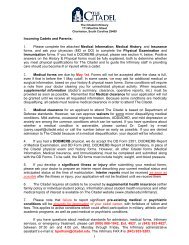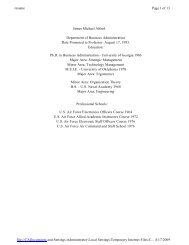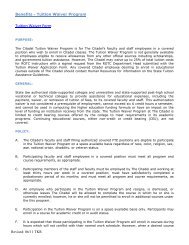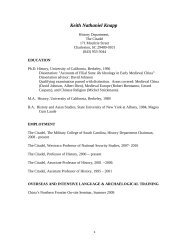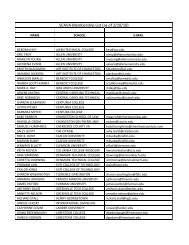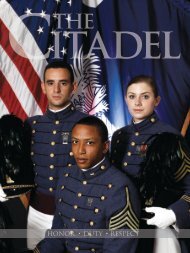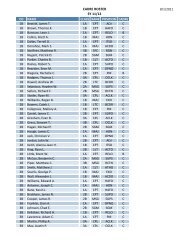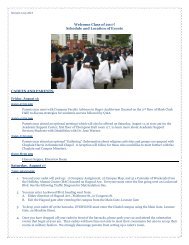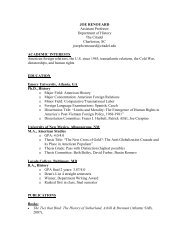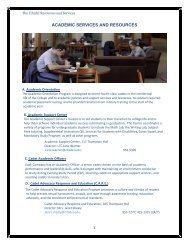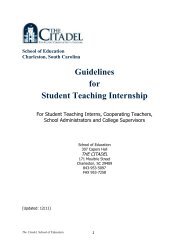Honor • Duty • Respect - The Citadel
Honor • Duty • Respect - The Citadel
Honor • Duty • Respect - The Citadel
- No tags were found...
You also want an ePaper? Increase the reach of your titles
YUMPU automatically turns print PDFs into web optimized ePapers that Google loves.
Petty Officer 1st Class Roland G. Blake, III, USCG, ’98Palmetto Battery, Business Administration majorJacksonville, Fla.Over the last 12 years, Ron Blake has seen a surprising variety ofcountries and climates, ranging from Kodiak, Alaska, to McMurdoStation, Antarctica, with stops in Panama and Petropavlovsk,Russia. He’s been to Australia, Tasmania, Cuba, Aruba, Colombia,Peru, Mexico, Argentina and Chile. Who would have guessedthat he’s been traveling all this time with the U.S. Coast Guard?As a cadet, Blake drilled with the Naval and Air Force ROTCunits on campus, but the Coast Guard was his true calling. <strong>The</strong><strong>Citadel</strong> was not yet affiliated with a Coast Guard detachment,so he contacted a recruiter before his senior year and enlistedas a seaman. He’s since served on 10 deployments across theAtlantic and Pacific and was promoted earlier this year to aviationelectronics technician’s mate petty officer first class, a rank moreaffectionately known as a tweet.A helicopter flight mechanic, Blake is the shift maintenancesupervisor responsible for all the electronics, radios, wiring andnavigation systems in his unit’s aircraft, mostly MH-65 Dolphinhelicopters. He jokes that his is like most jobs in any branch ofmilitary service—about 90 percent boredom and 10 percentsheer terror. In reality, he often works 24-hour days, and longerfor search and rescue missions, usually in extreme situations andtreacherous conditions. His deployments are rarely planned inadvance, but rather an immediate response to the impendingthreat of a hurricane, natural disaster or countless other safety orsecurity hazards.Over the years, he’s experienced the rush of saving lives indanger and the solemn duty of recovering those lost at sea. He’slost close friends in helicopter crashes. He’s pulled a heart attackpatient off a Lake Huron freighter in the middle of the night,limping back on a single-engine to an unfamiliar airport. He oncesaved two infants and a 2-year-old from raging floodwaters whenan Indiana campground was overrun in a sudden storm.<strong>The</strong>se days, Blake is stationed in Jacksonville, Fla., workingwith a law enforcement unit. He and his team made headlinesthis summer for the first-ever capture of a self-propelled semisubmersibledrug vessel in the western Caribbean. After anexhilarating helicopter and boat chase, they apprehended thedrug-smuggling crew and recovered 15,000 pounds of cocainewith an estimated street value $180 million.It’s not exactly a 9-to-5 job, but saving lives and stoppingsmugglers is a day in the life of a U.S. Coast Guard tweet.Curtis A. Campbell, ’94India Company, Business Administration majorRoswell, Ga.In high school, Curtis Campbell was recognized as the King ofISS. That distinction was hardly a resume builder. ISS means “inschoolsuspension.” Campbell, who attended Goose Creek HighSchool, defied authority the way many teenagers do—he skippedclass, fought and talked back to teachers. Although he lackeddiscipline in the classroom, Campbell was a driven athlete on themat where he was a star high school wrestler.His father, a 22-year enlisted sailor in the Navy, was oftendeployed while his mom, a Taiwanese immigrant, worked severaljobs. For years she waited tables during the day and cleanedDelta airplanes at night to make ends meet.Campbell never thought much about college. No one in his familyhad ever attended before. But that changed after a wrestlingmatch, where he met Associate Athletic Director Ed Steers, ‘68,member of <strong>The</strong> <strong>Citadel</strong> Athletic Hall of Fame and former standoutwrestler himself. Steers spoke about <strong>The</strong> <strong>Citadel</strong> and the uniquechallenges it provided. He explained how the college molds cadetsinto leaders and what it means to wear the ring.In the summer of 1990, Campbell signed up for one of thetoughest and potentially most rewarding challenges he had facedso far—the fourth class system.Seventeen years later, Campbell says <strong>The</strong> <strong>Citadel</strong> changed hislife. He flourished in an environment that drilled the qualitiesof discipline, leadership and service deep into his core. As acadet, he served on cadre and became a company clerk, firstsergeant and, eventually, battalion officer. He carried the call toleadership with him beyond Lesesne Gate.Campbell has spent the last 12 years leading the productmanagement and marketing divisions for some of the largesttechnology companies in the world. As an MBA intern withHewlett Packard, he was recognized as the company’s top internworldwide. At Dell, he led the largest division in the company,responsible for $8 billion in revenue. Now at Newell Rubbermaidwhere he was recently recruited, he leads the product teamsfocused on commercial identification solutions.Campbell holds a bachelor’s degree from <strong>The</strong> <strong>Citadel</strong> and aMaster of International Business from the University of SouthCarolina, and recently completed the Program for LeadershipDevelopment at Harvard University.<strong>The</strong> former King of ISS now lives in Atlanta with his wife and twosons. He continues to receive recognition, but now, it’s only thegood kind. Minority MBA Magazine named Campbell one of theTop 100 Emerging Business Leaders in America.56 <strong>The</strong> <strong>Citadel</strong> 2011



